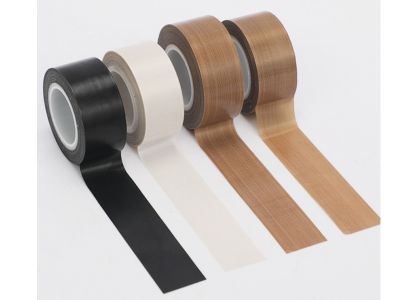
In highly corrosive settings—whether in aggressive chemical plants, pharmaceutical cleanrooms, or offshore drilling platforms—uninterrupted protection of seals, joints, and wrap-around insulations is mission-critical. That’s why leading PTFE-coated fiberglass tape manufacturers have engineered next-generation composites such as Teflon impregnated fiberglass tape, Teflon fiberglass tape, and fiberglass tape coated with Teflon, delivering a seamless barrier against acids, alkalis, solvents, and high-temperature steam. These tapes marry the low-friction, non-reactive surface of PTFE with the tensile strength and thermal stability of woven fiberglass, ensuring that seals remain leak-proof, insulation stays intact, and critical equipment continues running smoothly—even under continuous chemical attack and extreme thermal cycling. By choosing products from reputable PTFE-coated fiberglass tape manufacturers, operations managers can reduce downtime, simplify maintenance routines, and achieve long-term cost savings without compromising safety or performance.
Industries such as chemical processing, pharmaceuticals, and oil & gas face relentless exposure to aggressive media that degrade ordinary tapes and sealants. Traditional adhesive products often fail in weeks or months, leading to costly leaks, downtime, and safety hazards. By contrast, advanced PTFE-coated fiberglass tape manufacturers supply tapes with a composite structure—high-temperature-resistant fiberglass backing fully encapsulated in PTFE—that resists chemical attack while preserving tensile strength and flexibility. The incorporation of Teflon impregnated fiberglass tape formulations adds an extra barrier, preventing permeation and maintaining a stable bond even when repeatedly wetted or submerged.
The remarkable durability of these tapes stems from PTFE’s inert polymer chains and the fiberglass’s dimensional stability. During manufacturing, tape producers control PTFE dispersion within the glass fiber matrix, achieving uniform coating thickness that prevents weak spots. Teflon tape fiberglass benefits from this synergy: the PTFE layer repels polar and non-polar chemicals alike, while the woven glass fiber core provides mechanical support. Laboratory studies confirm that both Teflon fiberglass tape and fiberglass tape coated with Teflon maintain over 90% of their original adhesion after 1,000-hour immersion tests in 10% hydrochloric acid and 5% sodium hydroxide solutions.
Real-world implementations demonstrate clear performance gains. A major chemical plant reported a 60% reduction in maintenance interventions after switching all flange seals to PTFE-coated fiberglass tape sourced from leading manufacturers. In pharmaceutical cleanrooms, Teflon impregnated fiberglass tape is preferred for sealing stainless-steel piping due to its non-contaminating and sterilizable nature. Offshore oil platforms use Teflon tape fiberglass for cable wrap and hose protection, leveraging its resistance to crude oil and drilling fluids. Meanwhile, power generation facilities rely on fiberglass tape coated with Teflon to insulate and protect high-voltage bus bars in corrosive steam environments.
To maximize longevity, follow these guidelines when applying PTFE-based fiberglass tapes:
Surface Preparation: Clean substrates thoroughly of grease, rust, and particulates for maximum adhesion.
Temperature Control: Apply tape within the manufacturer’s recommended temperature range (usually 10–40 °C) to ensure proper tack and contouring.
Tension and Overlap: Maintain consistent tension and at least 50% overlap between wraps to avoid gaps.
Curing Time: Allow a brief dwell period (often 12–24 hours) before introducing chemicals or mechanical stress.
Inspection Schedule: Perform visual checks quarterly; look for discoloration, peeling edges, or creasing.
Investing in premium PTFE-coated fiberglass tape reduces unplanned shutdowns, minimizes chemical leaks, and extends equipment service intervals—translating into significant cost savings. Enhanced chemical resistance also curtails hazardous exposures, bolstering workplace safety and regulatory compliance. Over a five-year horizon, many facilities report return on investment exceeding 200% due to diminished repair budgets and improved operational uptime.
Ongoing R&D in polymer chemistry promises next-generation PTFE-composite tapes with even broader chemical compatibility, higher temperature thresholds, and integrated sensing capabilities for real-time integrity monitoring. As environmental and safety regulations tighten, manufacturers and end-users alike will turn increasingly to advanced Teflon fiberglass tape solutions to meet stringent performance standards and sustain competitive advantage in global markets.